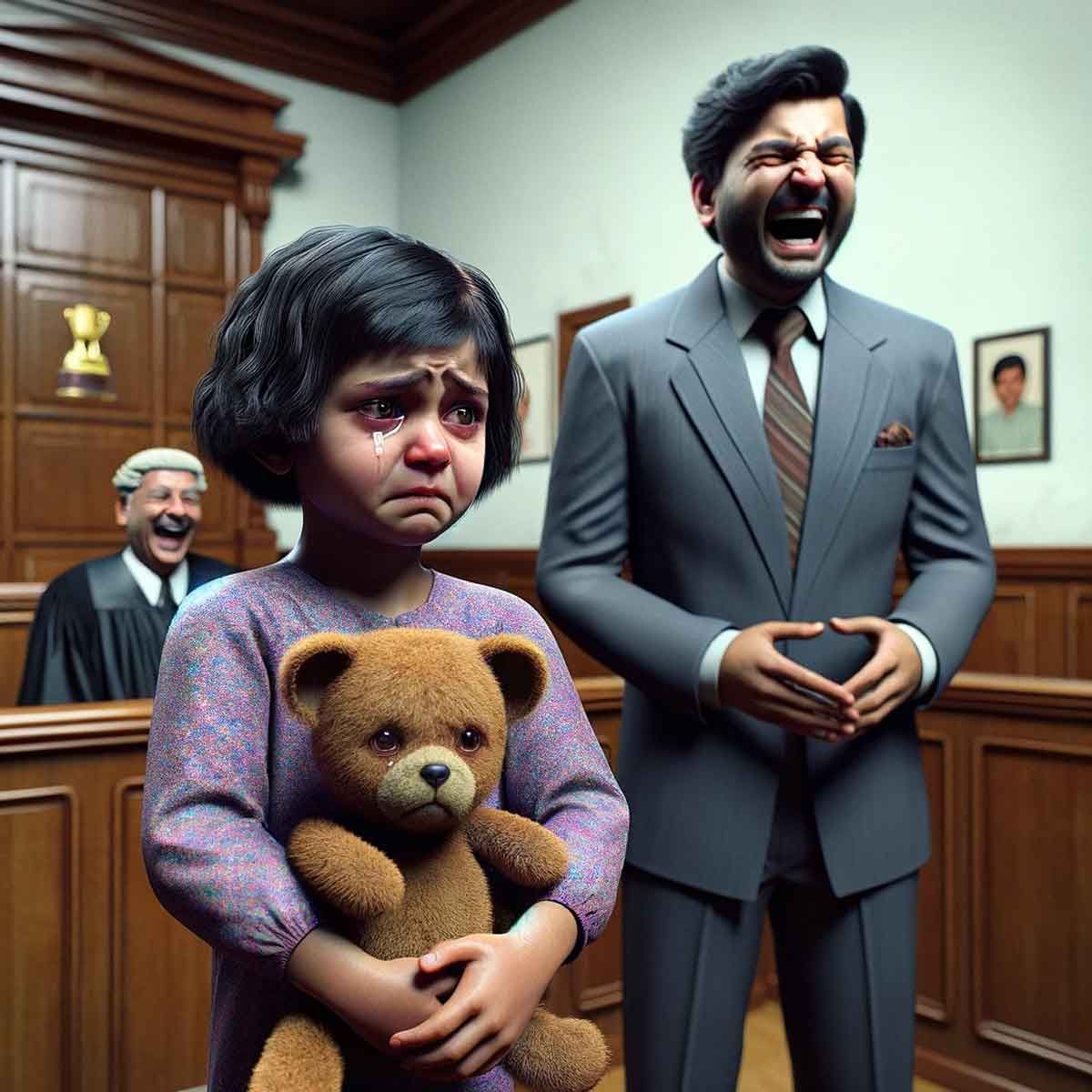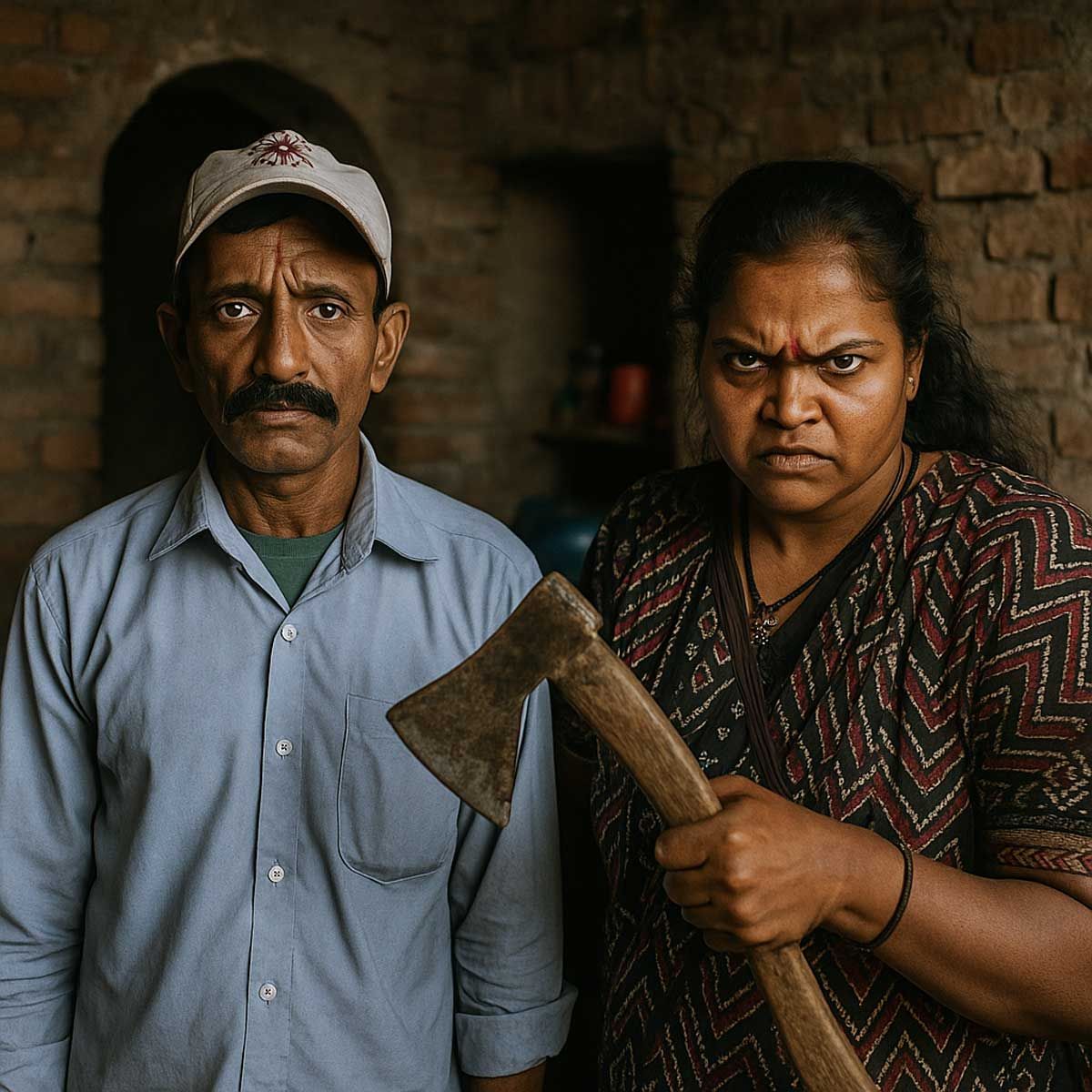More Coverage
Twitter Coverage
Satyaagrah
Written on
Satyaagrah
Written on
Satyaagrah
Written on
Satyaagrah
Written on
Satyaagrah
Written on
JOIN SATYAAGRAH SOCIAL MEDIA
"अंधा कानून": Rajasthan High Court overturns a decades-old rape conviction, ruling that removing a minor’s innerwear and undressing oneself does not constitute an 'attempt to rape,' but rather 'outraging the modesty of a woman' under Section 354 IPC

In a recent judgment, the Rajasthan High Court addressed a sensitive issue involving a six-year-old minor girl and an adult male accused. The court concluded that the specific actions of the accused—removing the girl's innerwear and undressing himself—did not meet the legal criteria for an 'attempt to rape' as defined under Section 376 read with Section 511 of the Indian Penal Code (IPC). Instead, these actions were reclassified as 'outraging the modesty of a woman,' an offense under Section 354 of the IPC.
Justice Anoop Kumar Dhand, presiding over the case as a single-judge bench, clarified the legal interpretation of what precisely constitutes an "attempt" in the context of these serious allegations. His ruling underscored the difference between an attempt to commit rape and an attempt to commit an indecent assault. According to Justice Dhand, to qualify as an attempt to rape, the accused must engage in actions that go beyond mere preparation. In this case, the court determined that the accused's actions, while deeply inappropriate and criminal, did not advance beyond the preparatory stage, thereby not constituting an attempt to rape.
The Rajasthan High Court elaborated on the legal framework required to evaluate whether an act constitutes an attempt to commit a crime. The court specified that three distinct stages need to be fulfilled for an act to be punishable under the category of "attempt."
Stage One: Intent The court explained that the first stage of an attempt revolves around the accused's intent. The accused must harbor an intention to commit the offence, which serves as the foundational psychological element of any criminal attempt. This initial stage is critical as it establishes the mental state required for further actions to be considered part of an attempt.
Stage Two: Preparation Following the establishment of intent, the accused must engage in preparatory actions. These actions are directed towards setting the stage for the commission of the crime. The court highlighted the importance of these preparatory acts, as they demonstrate a transition from mere intent to active steps in furtherance of committing the offence.
Stage Three: Proximate Actions The final stage involves the accused taking deliberate overt steps that bring them close to the actual commission of the crime. The court clarified that these steps, to qualify as an attempt, do not need to be the final actions before the crime is completed. Rather, they should be significant enough to clearly show the accused's intention to commit the crime, and they must be proximate to the crime's potential culmination.
The court further noted that any action that does not cross the threshold from preparation to attempt falls under the category of indecent assault, as outlined in Section 354 of the IPC. This classification applies when the actions of the accused, although inappropriate and unlawful, do not meet the criteria for an attempt as they do not pass beyond the stage of preparation.
In their ruling, the court emphasized, "The first stage exists when the culprit first entertains the idea or intention to commit an offence. In the second stage, he makes preparations to commit it. The third stage is reached when the culprit takes deliberate overt steps to commit the offence. Such overt act or step in order to be 'criminal' need not be the penultimate act towards the commission of offence. It is sufficient if such act or acts were deliberately done and manifest a clear intention to commit the offence aimed, being reasonably proximate to the consummation of the offence."
As per the case details, the 6-year-old prosecutrix alleged that the accused undressed both her and himself and fled the scene when she made hue and cry. However, there was no allegation that the accused attempted penetration.
The initial legal proceedings resulted in the accused being convicted under Sections 376/511 of the IPC, which deal with attempted rape. However, upon further deliberation, the court decided to amend this conviction to Section 354 of the IPC, which pertains to outraging a woman's modesty, reflecting a different interpretation of the accused's actions.
This decision was influenced by comparisons to similar cases, notably the case of Sittu v State of Rajasthan. In the Sittu case, the actions of the accused—who forcibly undressed a girl and attempted to penetrate her despite her resistance—were determined by the court to clearly exceed mere preparatory actions and thus amounted to an attempt to commit rape.
On the other hand, the case of Damodar Behera v State of Orissa provided a relevant legal precedent more closely aligned with the current case. In the Behera case, the accused had removed the victim's saree but subsequently fled upon noticing other people, leading the court to determine that such actions did not constitute an attempt to commit rape. Instead, these actions were deemed to fulfill the criteria for an indecent assault under Section 354 of the IPC.
Relying on the court orders cited, the Rajasthan High Court concluded, “Looking to the fact that the allegations have been leveled against the appellant, that he took-off the inner wear of the prosecutrix ‘D’ and also undressed himself, certainly, such act of the appellant does not amount to commission of offence under Section 376/511 IPC… In other words, the accused-appellant cannot be held to be guilty of attempt to commit rape.”
It further stated, “The prosecution has been able to prove the case of assault or use of illegal force on the prosecutrix ‘D’ (PW-2) with an intention to outrage her modesty or with knowledge that her modesty was likely to be outraged. Thus, it is a clear case of Section 354 I.P.C. as the act of present accused has not proceeded beyond the stage of preparation.”
The court noted that the accused was below 25 years of age when he committed the act and he remained in jail for a total period of about 2.5 months.
Given these factors, the court restricted the custodial sentence of the accused-appellant to the period already undergone by him, stating that this would meet the ends of justice. In its order, the court elaborated on the following reasons—
(i) Age at the time of the incident: The court highlighted, "At the time when the offence under Section 354 I.P.C. was committed, the accused was below 25 years of age."
(ii) Time elapsed since the incident: The court remarked on the significant passage of time since the incident, stating, "The incident took place on 9th March 1991 and near about 33 years have passed and this period is sufficient to exhaust anybody mentally, physically, and economically."
(iii) Duration of incarceration: The court noted, "He has been in jail for about 2½ months during investigation, trial, and appeal."
(iv) Decision against further incarceration: The order added, "After such a long time for the offence under Section 354 I.P.C. the accused should now not be sent to jail and this Court does not think it proper to send back the accused-appellant in custody."
Based on these considerations, the court partly allowed the appeal filed by the accused-appellant. It modified the Sessions Judge's judgment and order dated 3 July 1991, changing the sections of the offence from Sections 376/511 to Section 354 of the IPC.
In its conclusive wisdom, the Rajasthan High Court decided to tie a neat bow on the matter concerning the accused-appellant’s unsettling adventure in sartorial removal. The court sagely noted, "However, for the offence under Section 354 I.P.C., the accused-appellant is sentenced to the period already undergone by him." In other words, the time the accused spent contemplating life behind bars during his brief stint in jail was deemed just enough penance for his antics.
Furthermore, the court took a moment to pat the back of its own administrative process, stating, "The order of sentence dated 03.07.1991 passed by the learned Sessions Judge, Tonk stands modified accordingly." With this stroke of the judicial pen, the initial ruling of the Sessions Judge was retrofitted to fit snugly within the confines of current judicial thinking.
Thus, with all the gravity and solemnity of a court that’s seen it all, the final gavel fell, sealing the deal on a sentence that was already served. A round of silent applause for judicial efficiency, and off we go until the next courtroom drama unfolds.
 Support Us
Support Us
Satyagraha was born from the heart of our land, with an undying aim to unveil the true essence of Bharat. It seeks to illuminate the hidden tales of our valiant freedom fighters and the rich chronicles that haven't yet sung their complete melody in the mainstream.
While platforms like NDTV and 'The Wire' effortlessly garner funds under the banner of safeguarding democracy, we at Satyagraha walk a different path. Our strength and resonance come from you. In this journey to weave a stronger Bharat, every little contribution amplifies our voice. Let's come together, contribute as you can, and champion the true spirit of our nation.
 |  |  |
| ICICI Bank of Satyaagrah | Razorpay Bank of Satyaagrah | PayPal Bank of Satyaagrah - For International Payments |
If all above doesn't work, then try the LINK below:
Please share the article on other platforms
DISCLAIMER: The author is solely responsible for the views expressed in this article. The author carries the responsibility for citing and/or licensing of images utilized within the text. The website also frequently uses non-commercial images for representational purposes only in line with the article. We are not responsible for the authenticity of such images. If some images have a copyright issue, we request the person/entity to contact us at This email address is being protected from spambots. You need JavaScript enabled to view it. and we will take the necessary actions to resolve the issue.
Related Articles
- "Permission marketing is marketing without interruptions": Supreme Court responds to Vice-President; says as per Constitution, Parliament has right to enact law but Court has power to scrutinize it, Govt functionaries comments on collegium not well taken
- "We must distinguish between speaking to deceive and being silent to be reserved": After Delhi and Allahabad, Madhya Pradesh High Court also admitted PIL challenging the constitutional validity of the Waqf Act, enacted by Congress Govt in 1995
- SC's interim order restraining mosque surveys under the Places of Worship Act sends a troubling signal, empowering mob veto and prioritizing 'harmony' over constitutional rights and judicial independence, raising serious concerns for democracy
- Even the most ruthless criminals who tortured and killed a woman & her parents over 'witchcraft' deserves dignity, says Orissa HC, commuting death sentences to life imprisonment, as courts prioritize reform while justice for the victims fades into silence
- Calcutta High Court's landmark judgment illuminates the secular essence of Durga Puja, reinforcing citizens' constitutional rights and India's unity in diversity, a celebration beyond religion, it embodies vibrant spirit of communal harmony & tradition
- "Nepotism will never give you success, but talent can": Delhi Court framed charges against DCW Chairperson, Swati Maliwal and 3 others for abusing their official positions and illegally appointing various acquaintances, says “Clearly Reflects Nepotism”
- Uphaar Cinema fire was one of the worst fire tragedies in recent Indian history: Association of Victims of Uphaar Fire Tragedy (AVUT) filed a landmark case considered a breakthrough in civil compensation law in India
- "Unheard of:" Bombay High Court deprecated Maharashtra government for keeping a 21-year-old student Nikhil Bhamre in jail for a social media post that did not even name NCP Chief Sharad Pawar
- "वक्र तुंड महाकाय, सूर्य कोटि समप्रभ:, निर्विघ्नं कुरु मे देव शुभ कार्येषु सर्वदा": Karnataka HC countered nefarious agendas of Islamo-leftist lobby and upheld decision of allowing Ganesh Chaturthi celebrations at Hubballi Idgah maidan, गणपति बप्पा मोरया
- "Justice delayed is justice denied": Public servant can be held guilty under Prevention of Corruption Act based on circumstantial evidence: Supreme Court, 'mere acceptance of an illegal gratification without anything more would not make it an offence'
- "A verbal contract isn't worth the paper it's written on": Google moves Supreme Court against National Company Law Appellate Tribunal (NCLAT) order upholding CCI's ₹1,337 crore penalty for abuse of dominant position within the Android ecosystem
- "To no one we shall sell, to no one we shall deny or defer right or justice": Delhi High Court refuses to entertain Sameer Wankhede plea seeking protection in the disproportionate assets case, came to limelight as NCB questioned celebrities in drugs case
- "Traitors are hated even by those whom they prefer": Bengaluru Eng student Faiz Rasheed sentenced to a 5 year jail term for celebrating Pulwama terrorist attack on Facebook, said more such attacks needed to free Kashmir and asked "how is the khauf"
- "At his best, man is the noblest of all animals; separated from law and justice he is the worst": Justice P Velmurugan, Madras HC observed that "Evidence of woman's relatives in matrimonial dispute can't be brushed aside terming them interested witnesses"
- "I ask you to judge me by the enemies I have made": CJI NV Ramana retires today, a look at his last sitting in SC, Ex-SCBA President Dushyant Dave said, "You have been citizens' judge, you stood up for them to uphold their rights and Constitution"




























